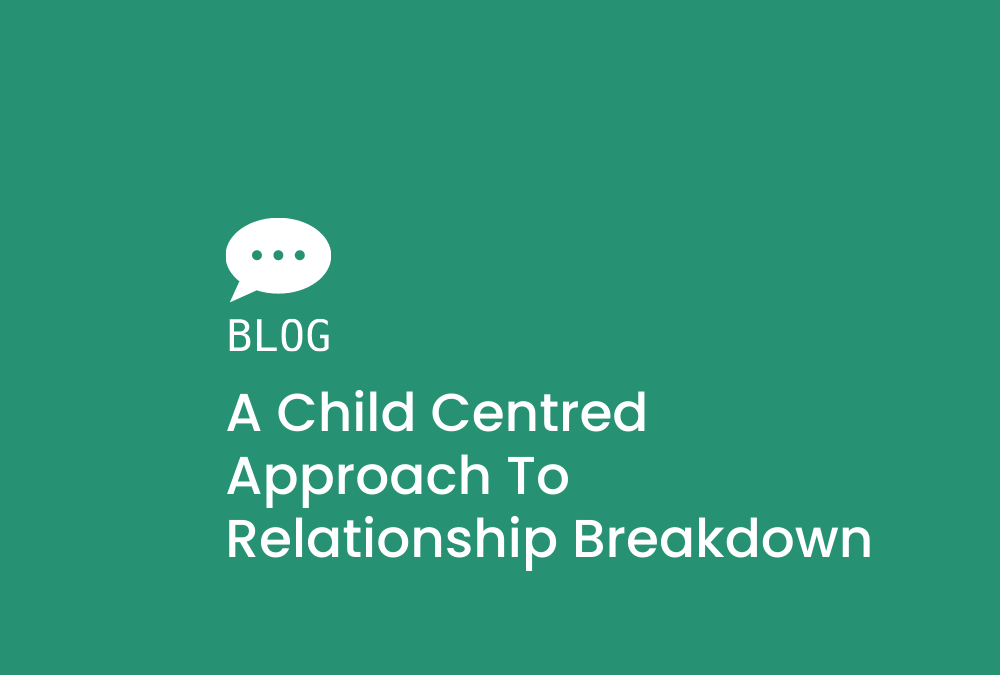A child-centred approach to relationship breakdown
The effect of relationship breakdown:
Divorce and the breakdown of a relationship can be an extremely stressful and traumatic experience, particularly for any children involved within the relationship. Hardships and arguments between the parents of a child can unknowingly and unintentionally effect the child’s health including their mental health and wellbeing. Often, I hear the saying, children are very resilient and are able to brush incidents of, however, this is not always the case for every child and in some cases, children may appear to be ignoring stressful events when it really is affecting them more than parents know.
If parents argue and fight while in the process of a divorce, this may cause added, unwanted stress for the child/children within the process. Divorces can often be very long, drawn out processes that can be very trying for all the parties involved. This then creates a domino like effect, with the stress moving from the parents to the children. When a child is young it is paramount to ensure they maintain a good mental health and wellbeing, if this does not happen it may lead to severe problems with the child’s mental health in the future. Divorce can also severely affect the parent’s mental health as well as the child’s as constant back and forth disagreements are bound to eventually cause unwarranted stress.
Family Mediation can help to combat this as it involves the parties within the divorce, coming together in a civilised manner to discuss arrangements that are in everybody’s best interests, specifically any children. Mediation is the process whereby families can negotiate any future arrangements for children, with the help of a neutral third party, a mediator. The mediator does not tell the parties what to do, instead they help the parties to reach their own agreements amicably, whilst trying to improve communication between them.
The family mediation process
The first step of mediation is a referral, this involves either party or their solicitors making a referral to a family mediation service. After this, the next stage is a Mediation Information and Assessment meeting (MIAM). This meeting is to establish whether mediation is the suitable course of action in the party’s circumstances. Since April 2014, it has been a legal requirement that anyone applying to the courts for assistance in resolving disputes over children and finances is required to attend a MIAM beforehand. There are some exceptions to this rule i.e. in the case of any domestic abuse against one of the parties.
Once it has been established that mediation is suitable and both parties are willing to attend, a joint session will be set up to allow the parties to discuss and each one put their views and requests forward. The aim of these sessions is to reach an agreement which both parties are happy with going forward. Once an agreement is reached it will be documented in writing. These are not legally binding; however, you can take them to a solicitor if you want to create a consent order which can be enforced by the courts.
Mediation Benefits
Mediation has many benefits, the most obvious being that it is quicker and sometimes more effective than a long court procedure that needs to involve other professionals and therefore more expensive. As the parties share the cost of the sessions and the final mediation documents, it can be a fraction of the cost of court which includes solicitors’ fees etc.
Mediation can cost 75% less than the court process. It also can be a quicker process, it generally takes 2-4 sessions to reach a final agreement which can be done within a couple of months as apposed to court proceedings which could take years to finalise, causing added, unwanted stress and anxiety. It Is also much more flexible than rigid court proceedings. The parties can decide the date/time of the sessions to best suit their schedules and needs.
Mediation is a lot less stressful than lengthy court procedures and it allows the parties to meet in a peaceful, less intimidating environment to deal with certain, nagging issues. This creates more peaceful negotiations which are less likely to cause stress and anxiety which would potentially be passed on to any children. Mediation also ensures that the parties work together to form an agreement that they are both happy with, one party will not be disadvantaged as there is no strict, court enforced ruling.
Mediation can also help to promote a better relationship between the parties in the future when dealing with the children. If the negotiations are completed in an effective manner, where the parties compromise in order to provide the best outcome and an amicable agreement is reached, there are less likely to be conflict situations in the future which is overall better for any children involved. There will be no need to place more blame on one of the parties over the other causing damaging relationships between the parties which ultimately will affect the children.
Mediation can also involve asking the children themselves about what they want the outcome to be. This allows the children to have a voice and their opinions to be heard as in the end they will be the ones that have to contend with the outcome of the sessions.
Mediation has many benefits which make it the easier, most effective way to discuss and finalise any arrangements that involve the children and the finances while going through divorce proceedings. One of the biggest benefits being that it creates a calm environment for the children in what is an already stressful event. If the parents are amicable and are able to come to mutually agreeable proposals there is no reason why mediation cannot provide the best outcome possible for all of the family which at the end of the day has to be the best way forward.
Guest blog- Chloe Lorimer

